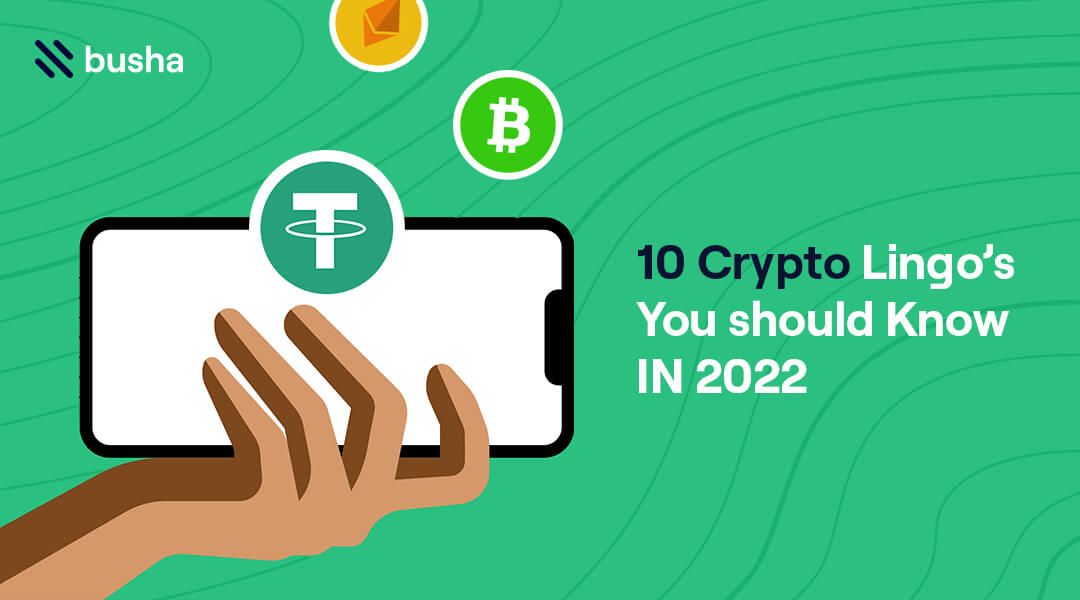
10 Crypto Lingo’s You should Know in 2022
With the ever-evolving nature of the crypto space, we decided to curate some of the most used terms, ideas and concepts every Nigerian should know before and after getting ready for their crypto journey.
Let’s dive in
- APY- the term stands for Annual Percentage Yield. Even though this concept has been used through out time in different formats like annual interest, yearly interest, amount paid to you, and compounded interest, they drive one simple meaning. APY is the total amount to you in percentage as a result of saving a certain amount of money or cryptocurrency in a savings account. The higher the APY rate, the money you are able to get over an agreed period of time.
- Blockchain: the concept of blockchain or blockchain technology is often viewed as rocket science. “We just never really understood until now it! …. “Imagine you had a record of all customers who bought your product. After each purchase, you entered each name and amount into a ledger/book/note/spreadsheet or document. This ledger contains a date, numerical order and amount at which each buyer/owner buys a product and all details are kept and managed for future and reference purpose”. From this 5 year old breakdown, we see that only this merchant has a record of all information about the sales and ownership made within a given timeline. In the case of blockchain, it does exactly what the ledger has done but with more speed, security and efficiency. A blockchain therefore explains a series of blocks primarily linked together for the purpose of storing, sharing, protecting and exchanging information. When a change is made to any block of information that already exists (say the owner of a purse you sold resells that same purse to another individual) the record of that exchange is not altered, but rather a new block is automatically created to record this new entry. With blockchain technology this records are not only contained in now book/ledger/document/pc but rather, any device with access to the internet. Blockchains store assets/currency/information on decentralized networks beyond the government control unlike traditional banks and financial organisations
- Cryptocurrency: understanding the secret behind a blockchain makes the concept of cryptocurrencies easier to understand. Cryptocurrency means encrypted money. For better understanding, cryptocurrencies are digital measure of value that can be stored, transferred or exchanged without the use of an intermediary (like banks). Being encrypted simply means that cryptocurrencies aren’t physical, but all records of ownership and transactions are stored on a blockchain. These digital assets can be accessed with the use of crypto wallets like Busha.
- DeFI: Decntralized Finance (DeFI) has become one of the most talked about opportunities making the crypto economy stand out. Decentralized finance is a general term used to classify all activities within a blockchain-based platform offering users the ability to earn interest, save and enjoy financial services without third-party involvement. With DeFI, Nigerians can enjoy high levels of privacy/security in transacting cryptocurrencies across global markets, access to alternative store of value and freedom from centralized financial authorities like banks and third-party investors which ensures transparency.
- ERC Tokens: Crypto Tokens make up 20 of the most traded cryptocurrencies in global markets. The Ethereum Blockchain has its native coin as ether (ETH) which fuels the creation and management of tokens to be created on its network. Not only does this blockchain support the creation of new tokens for different functions, but also allows users to build and run Decentralized applications (Dapps)
- Proof of Work: Before new blocks of information can be added to a blockchain network, there are two major mechanisms that ensure their validity and authenticity of every entry. Proof of Work explains a secured process were a group of verified crypto miners race to solve a mathematical puzzle. Whoever solves the puzzle first is then allowed to update/intiate changes on a new block and rewarded with a predetermined amount of crypto
- Smart Contracts: digital conditions/agreements stored in form of programs on a blockchain that are automatically executed when predetermined terms and conditions are met. They are programs that exist on blockchains to eliminate intermediaries and execute actions once two parties agree, provide and meet the needs of one another. Smart contracts are the sauce behind the speed, agility and security of the crypto ecosystem.
- Stablecoins: These are tokens pegged to a real-world asset like gold or currency like the US Dollar. A couple of examples include; USDT, BUSD, USDC, PAXG, DAI.
- NFTs: Non-fungible tokens (NFTs) are extraordinary computerized resources whose proprietorship is followed on a blockchain, normally Ethereum. In more simpler terms, NFTs can be any digital asset whose ownership can be tracked, verified and authenticated using blockchain technology. This means that each unique digital asset is irreplaceable and its ownership can be shared by only those who own it.
- Web 3: Also called ‘Web 3.0’, the concept describes the practice of decentraizing and making the internet “user-owned”. This means that individuals will have possess the ability to create, destroy, share, permit, earn and so many more opportunities without giving up private data to advertisers or companies. The theory and practice of web 3.0 is hinged on advancements in web 2.0 which is currently what we still consume. With web 2.0 access to the internet increased interactions and these interactions produced personalised data usually collected by big data companies to understand the users more and provide tailor made contents, services and products for their consumption.

